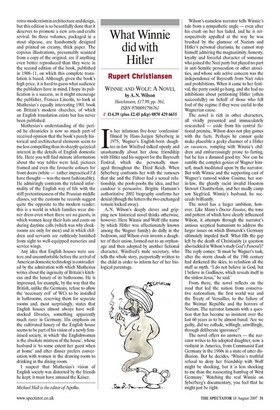What Winnie did with Hitler
Rupert Christiansen WINNIE AND WOLF: A NOVEL by A.N. Wilson Hutchinson, £17.99, pp. 361, ISBN 9780091796761 © £1439 (plus £2.45 p&p) 0870 429 6655 1 n her infamous five-hour 'confession' filmed by Hans-Jurgen Syberberg in 1975, Wagner's English-born daughter-in-law Winifred talked openly and unashamedly about her close friendship with Hitler and his support for the Bayreuth Festival, which she personally managed throughout the Third Reich. When Syberberg confronts her with the rumours that she and the Rihrer had a sexual relationship, she pooh-poohs the idea, and her candour is persuasive. Brigitte Hamann's authoritative 2002 biography confirms her denial (though the letters the two exchanged remain locked away).
A.N. Wilson's deeply clever and gripping new historical novel thinks otherwise, however. Here Winnie and Wolf (the name by which Hitler was affectionately known among the Wagner family) do dally in the bedroom, and Wilson even invents a daughter of their union, farmed out to an orphanage and then adopted by another fictional character, Winifred's male secretary, who tells the whole story, purportedly written to the child in order to inform her of her biological parentage.
Wilson's nameless narrator tells Winnie's tale from a sympathetic angle — even after his crush on her has faded, and he is retrospectively appalled at the way he was brushed by the glamour of Nazism and Hitler's personal charisma, he cannot stop himself admiring the magnanimity, honesty, loyalty and forceful character of someone who joined the Nazi party but played no part in anti-Semitic persecution or other atrocities, and whose sole active concern was the independence of Bayreuth from Nazi rules and prohibitions. When it came to her festival, the party could go hang, and she had no inhibitions about petitioning Hitler (often successfully) on behalf of those who fell foul of the regime if they were useful to the Wagnerian cause.
The novel is rich in other characters, all vividly presented and immaculately researched — aside from his central fictional premise, Wilson does not play games with the facts. Perhaps he cannot quite make plausible a geeky charmer of a Hitler en vacances, romping with Winnie's children and embarrassingly prone to farting, but he has a damned good try. Nor can he rumble the complex genius of Wagner himself, much meditated upon by the narrator. But with Winnie and the supporting cast of Wagner's ramrod widow Cosima, her sonin-law, the ghastly racist invalid Houston Stewart Chamberlain, and her madly camp son Siegfried, Winnie's husband, he succeeds brilliantly.
The novel has a larger ambition, however. Like Mann's Doctor Faustus, the tone and pattern of which have clearly influenced Wilson, it attempts through the narrator's anxious sceptical humanism to address the larger issues on which Bismarck's Germany ultimately impaled itself. What fills the gap left by the death of Christianity (a question also tackled in Wilson's study God's Funeral)? The reply comes: 'It must be Wagner's task, after the storm clouds of the 19th century had darkened the skies, to refashion all the stuff as myth. "I do not believe in God, but I believe in Godliness, which reveals itself in the sinless Jesus," he said.'
From there, the novel reflects on the road that led the nation from conservative nationalism, the first world war and the Treaty of Versailles, to the failure of the Weimar Republic and the horrors of Nazism. The narrator laments with a question that has become so insistent over the last 60 years as to be almost banal: 'Are we guilty, did we collude, willingly, unwillingly, through deliberate ignorance?'
The novel offers no answers — the narrator writes to his adopted daughter, now a violinist in America, from Communist East Germany in the 1960s in a state of utter disillusion. But he decides, `Winnie's truthful refusal to deny her friendship with Wolf might be shocking, but it is less shocking to me than the nauseating humbug of West Germany.' Watching the real Winnie on Syberberg's documentary, you feel that he might just be right.












































 Previous page
Previous page